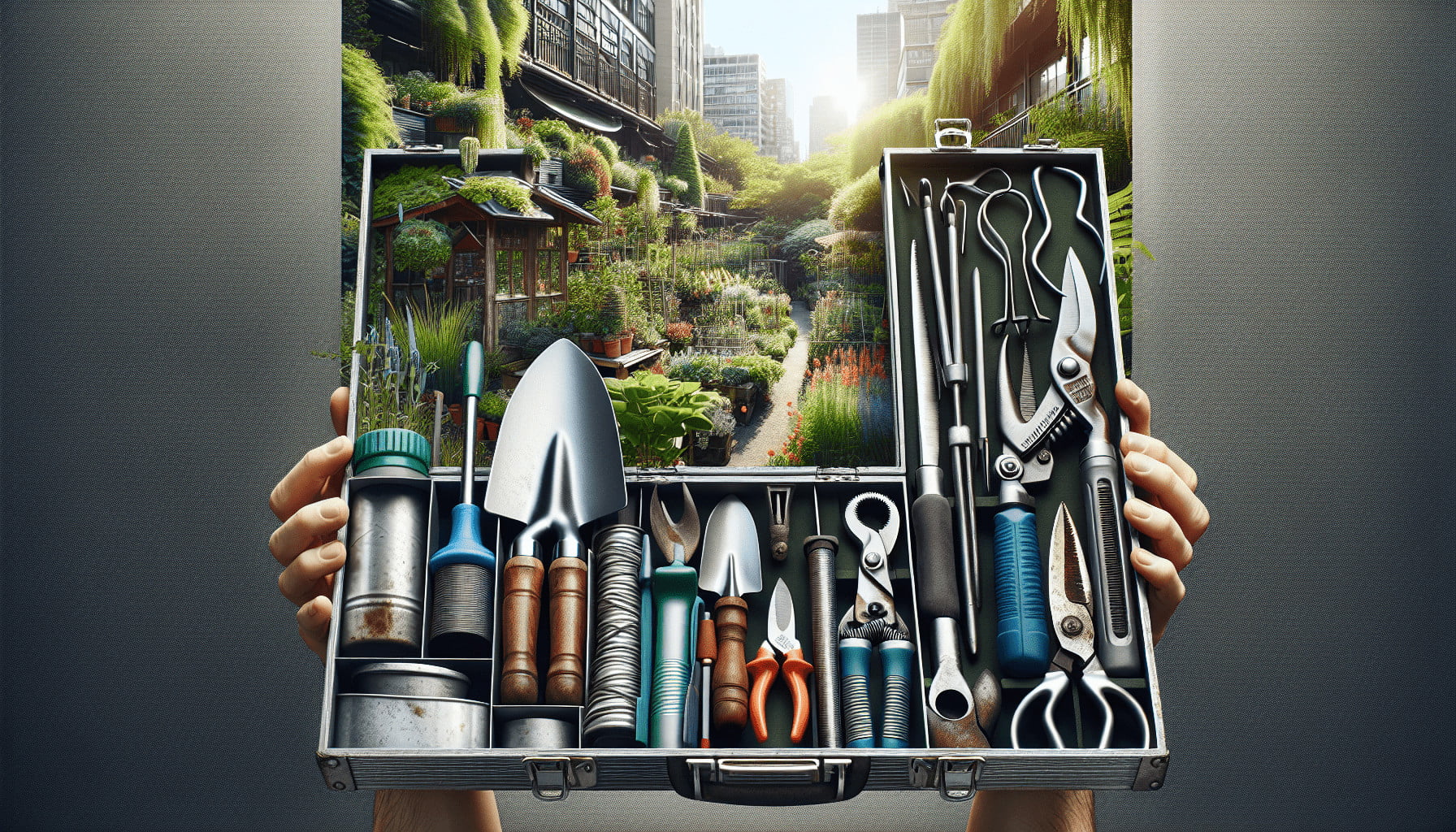If you’re an urban gardener, you understand the joy and rewards that come with tending your green oasis amidst the cityscape. However, protecting your tools from rust can be a daunting task given the humidity, rain, and unpredictable urban environment. “Best Ways To Protect Tools From Rust In Urban Garden Settings” offers practical advice and easy-to-follow tips to ensure your gardening tools remain in top condition, saving you money and effort in the long run. Whether you’re a seasoned gardener or just starting out, this article will be your go-to guide for maintaining your precious tools rust-free. Have you ever noticed how quickly your gardening tools can start to rust and wear out, especially in an urban garden setting? It’s almost as if the city air speeds up the process! But don’t worry, with some simple strategies, you can keep your tools in top shape for years to come.

Why Rust is a Problem for Garden Tools
Rust isn’t just unsightly; it can actually weaken your tools, making them less effective and more prone to breaking. Over time, rust can eat away at metal, resulting in tools that are brittle and unreliable. In an urban garden setting, where space is often limited and tools get heavy use, this can be a significant problem.
Understanding the Causes of Rust
Before diving into the best ways to protect your tools, it’s crucial to understand what causes rust in the first place. Rust forms when iron or steel reacts with water and oxygen to create iron oxide. Urban environments can accelerate this process due to various factors like humidity, pollution, and limited storage space.
Humidity and Moisture
Urban areas often have high levels of humidity, especially in certain climates, which provides the moisture necessary for rust to form. Water can seep into even the tiniest cracks and crevices of your tools, leading to oxidation.
Pollution
Airborne pollutants such as sulfur dioxide and nitrogen oxides can combine with rain to form acid rain, which accelerates the rusting process. Cities tend to have higher concentrations of these pollutants, making urban gardens more susceptible to rusty tools.
Storage Conditions
Limited storage space often means that tools are left outside or in poorly ventilated areas. Basements, garages, or sheds with inadequate airflow can also trap moisture, making them ideal environments for rust formation.
Best Ways to Protect Your Tools from Rust
Now that you know why rust is a problem and what causes it, let’s talk about how you can protect your tools. Below are some simple and effective strategies to keep rust at bay.
Clean Your Tools Regularly
Cleaning your tools after each use is one of the best defenses against rust. Dirt, sap, and debris can hold moisture against the metal, catalyzing rust formation.
- Wash with Water and Mild Soap: After using your tools, wash them with water and a mild soap to remove any soil and plant residue.
- Dry Thoroughly: After washing, make sure to dry your tools thoroughly. Leaving even a little moisture can invite rust.
Oil Your Tools
Applying a thin layer of oil to your tools can create a barrier that moisture can’t penetrate. Vegetable oil is a good option because it’s eco-friendly, but machine oil or motor oil can also work well.
- Choose the Right Oil: Opt for a non-toxic, biodegradable oil if you’re concerned about environmental impact.
- Apply Evenly: Use a cloth to apply a thin, even coat of oil to the metal parts of your tools.
Store Your Tools Properly
Proper storage can make a huge difference in preventing rust. Here are some storage tips:
- Use a Tool Rack: Hanging your tools on a rack allows for better air circulation and minimizes contact with wet surfaces.
- Avoid Ground Storage: Storing tools on the ground can increase exposure to moisture. Shelves or pegboards can be excellent alternatives.
Use Rust-Resistant Coatings
Rust-resistant coatings like paint or specialized rust-preventative sprays can offer long-term protection. These coatings can be particularly useful for tools that are used infrequently.
- Paint for Long-Term Protection: Paint provides a physical barrier against moisture and is ideal for tools that you don’t use often.
- Spray for Frequent Use: Rust-preventative sprays are more convenient for tools that you use regularly, as they are easier to apply and reapply when needed.
Utilize Protective Covers
Protective covers or cases can be incredibly effective at keeping moisture away from your tools. These can range from simple cloth covers to hard plastic cases.
- Cloth Covers: For tools like shovels and rakes, a simple cloth cover can keep dust and moisture at bay.
- Hard Cases: For smaller tools like pruners and shears, a hard plastic case can provide an added layer of protection.
Silica Gel Packs
Using silica gel packs is an easy and efficient way to absorb excess moisture in your storage area. These small, desiccant packs are very effective at reducing humidity.
- Place in Toolboxes: Pop a couple of silica gel packs into your toolbox or storage chest.
- Replace Regularly: Ensure you replace them periodically as they can become saturated over time.
DIY Rust Removal Techniques
Even with the best of care, rust may occasionally develop. Here are some DIY methods to remove rust from your tools:
- White Vinegar: Soak rusty tools in white vinegar overnight. Scrub with a brush and rinse thoroughly.
- Baking Soda Paste: Make a paste of baking soda and water. Apply it to the rusted area, let it sit for an hour, then scrub and rinse.
Expert Recommendations for Urban Gardeners
Still looking for more tips? Here are some expert recommendations tailored for urban gardeners like yourself.
Invest in High-Quality Tools
Better quality tools often come with rust-resistant materials or coatings already applied. Though they may have a higher upfront cost, the longevity and durability can be well worth the investment.
Seasonal Maintenance
At the end of each gardening season, take some time to do a thorough inspection and maintenance of your tools. This can include deep cleaning, oiling, and repairing any damage. It’s a good way to ensure your tools are ready for the next season.
Community Storage Solutions
If space is an issue, consider collaborating with other urban gardeners to create shared storage facilities. A well-maintained, community storage area can provide better climate control and security than individual, makeshift solutions.
Eco-Friendly Solutions
For those who are environmentally conscious, you can opt for eco-friendly products when cleaning and maintaining your tools. Products like biodegradable oils, natural rust inhibitors, and non-toxic cleaning agents are great choices.
Future Innovations
Keep an eye out for new technologies and products designed to combat rust. Innovations in materials science and coatings continue to make tools more rust-resistant, even in challenging urban environments.

Additional Tips and Tricks
To make rust prevention even more manageable, here are some additional tips and tricks that you might find useful.
| Tip | Description |
|---|---|
| Rotate Your Tools | Using different tools evenly can prevent any one tool from wearing out or rusting more quickly than the others. |
| Use Tool Liners | Applying liners to the handles of your tools can help keep them dry, reducing the chances of moisture seeping into metal parts. |
| Maintenance Schedule | Create a maintenance schedule to remind you when it’s time to clean, oil, or inspect your tools. Regularity can make all the difference. |
| Vinegar for Cleaning | White vinegar can be used not only for rust removal but also as a cleaning agent for daily maintenance. A quick wipe-down with vinegar can help remove corrosive salts and other residues. |
| Moisture Absorbers | Desiccants like moisture absorbers or damp-rid can be placed in storage areas to keep the environment dry. |
| Avoid Leaving Tools Out | Always remember to bring tools back inside after you’re done using them. Leaving tools outside overnight exposes them to dew and humidity, increasing the risk of rust. |
| Wooden Tool Handles | If your tools have wooden handles, treat the wood with linseed oil to prevent it from cracking and absorbing moisture. A well-maintained handle can help protect the metal parts by reducing overall moisture exposure. |
Frequently Asked Questions
You might still have some questions about the best practices for keeping your tools rust-free. Here are some frequently asked questions that might help.
How often should I oil my tools?
It’s a good idea to oil your tools after each use, especially if they’ve come into contact with moisture. However, if you’re unable to do this every time, aim to oil them at least once a week or after every few uses.
Can I use any type of oil for my tools?
While you can technically use any type of oil, it’s best to choose an oil that won’t damage your plants or the environment. Vegetable oil and biodegradable machine oils are excellent choices.
What should I do if a tool is already rusty?
If a tool is already rusty, you can use methods like soaking in white vinegar or applying a baking soda paste to remove the rust. After removing the rust, be sure to oil and properly store the tool to prevent future rusting.
Is it worth investing in rust-resistant tools?
Yes, investing in rust-resistant tools can save you time and money in the long run. These tools are generally made of materials or coatings that are less susceptible to rust, making them more durable and reliable.
How can I tell if my tools are stainless steel?
Stainless steel tools will often be marked as such on the packaging or the tool itself. Stainless steel is more resistant to rust than regular steel but is not entirely rust-proof. A magnet won’t stick to higher grades of stainless steel, which can be another indicator.
Conclusion
Urban gardening is a fulfilling and beneficial activity, but it comes with its own set of challenges, one of which is keeping your tools free from rust. By understanding the causes of rust and implementing the techniques outlined in this article, you can extend the life of your tools and ensure that they remain effective for many seasons to come.
So, start by cleaning your tools regularly, applying a protective oil, and storing them properly. Investing in high-quality, rust-resistant tools and utilizing eco-friendly solutions can make a significant difference as well. Plus, these habits not only preserve your tools but also enhance your overall gardening experience. Happy gardening!
